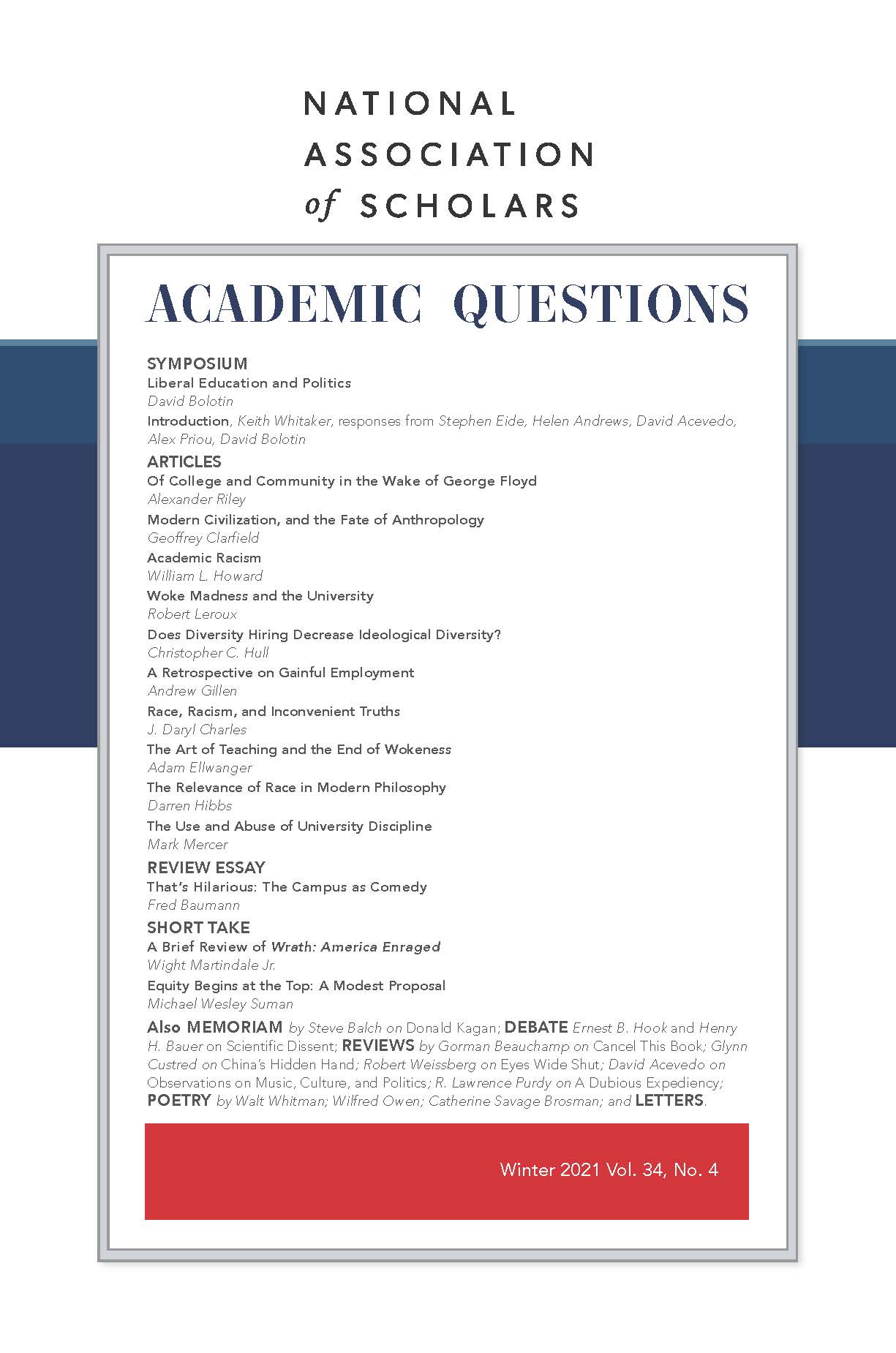Hidden Hand: Exposing How the Chinese Communist Party is Reshaping the World, Clive Hamilton, Mareike Ohlberg, One World Publications, 2020, pp. 418, $17.41 hardbound.
Glynn Custred is professor emeritus of anthropology at California State University, East Bay; [email protected]. Professor Custred is the author of A History of Anthropology as a Holistic Science (2016) and last appeared in our pages in spring of 2021 with “That’s Right, I Said It,” a review of Mark Levin’s Unfreedom of the Press (Threshold, 2019).
In 2018 I was invited to speak at the University of Munich on the topic of the German language as it is spoken in speech communities outside the German-speaking core area. After class, the students, their professor, and I went to a nearby beer garden for lunch where we talked informally about the topic which had brought us together. It was encouraging to see that three of the students majoring in German in Munich were from China, as indeed it’s gratifying to see students studying other languages in the countries where those languages are a part of the culture. In the course of our conversation, I asked the Chinese students if they knew of a linguist from their country who had helped bring modern linguistics to the traditional study of their language, and of another who had done the first field work on minority languages in China. One of those scholars, Y. R. Chao, is known as the father of modern Chinese linguistics, and the other, Li Fang-Kuei, the father of the study of minority languages in China. That was just one of the varied topics discussed over lunch in the shade of the trees that afternoon. This is an example of the nature of a university, an international community of scholars and students freely discussing a wide range of topics either formally or informally in a free exchange of ideas, in which different, and sometimes new information and perspectives are brought forward for consideration, and perhaps for further examination.
International student exchange programs and other forms of international academic cooperation are common activities of universities around the world. Their purpose is to further education and to advance the arts and sciences, as well as to strengthen international understanding. Some of those programs are sponsored by non-governmental organizations, and some by governments. In the case of government sponsorship, such programs have been called soft diplomacy, a way of presenting a country in a favorable light. But a closer look shows that China’s involvement in such activities, and its substantial financial investment in higher education abroad, go well beyond those traditional motives, forming one strand in a multi-varied and long-term strategy on the part of the Chinese authoritarian government to advance China to a position of overall global superiority.
China is run differently from other countries in the international community. The Chinese Communist Party (CCP), which rules the country, operates a repressive regime as seen in its treatment of its citizens and its ethnic and religious minorities, most notably the Moslem-Turkic-speaking Uighurs in the western part of the country. Beijing also manipulates the international market for its own advantage, disregarding international norms and stealing intellectual property. On top of all this, China is expanding its military, both in the size of its armed forces (they already have the largest navy in the world, strategically deployed), and in its military capability, which includes high tech and advanced nuclear weapons.
The CCP continues to expand its economic influence throughout the world, spending heavily on infrastructure projects in small countries in what they call the “Belt and Road Initiative.” These arrangements consist of one-sided trade deals and infrastructure projects which carry with them a heavy debt burden for targeted countries, thus leading to a dependency relationship with China, what has been described as a “debt-trap.” In this way China can occupy positions of influence in strategic places such as ports, trade routes, and valuable resource zones, a strategy which has been compared to the informal empire of an earlier era of colonialism.
The American media are aware of China’s behavior, for while reporting some of it, much has been ignored or downplayed, and in some cases the press even repeats the Chinese Communist Party line in their reporting and in their opinion pieces. This is because those news outlets are, for the most part, owned by large corporations, enterprises that are careful not to jeopardize their access to the lucrative Chinese domestic market. This caution extends to American business enterprises, including not only finance and manufacturing companies but sports and entertainment concerns as well, in what has been described as self-censorship for profit.
Despite the reluctance of the media and policymakers to face these realities, there are some intrepid critics willing to write about this quickly evolving situation. Among them are Bill Gertz, John Ratcliffe, Gordon Chang, Steve Mosher, David P. Goldman, Jonathan D. T. Ward, Joel Kotkin, Edward Luttwak, Michael Pillsbury, and Josh Rogin. Now we can include in this list Clive Hamilton and Mareike Ohlberg, authors of one of the most recent and comprehensive books on this subject, Hidden Hand: How the Chinese Communist Party Is Reshaping the World. The scope of their study is global, ranging from Australia, where Hamilton is based, to Europe, where Ohlberg is a fellow in the Asian Program of the German Marshall Fund. Hamilton is the author of Australia, Silent Invasion, and Ohlberg is the co-author of a report of the German-based Mercator Institute for China Studies, titled “Authoritarian Advance: Responding to China’s Growing Political Influence in Europe.” Hidden Hand is well sourced, citing experts from around the world as well as sources from inside China, some available only in the Chinese language.
The authors describe the authoritarian regime in China as the “party-state,” where the Communist Party controls all branches of the government, and they describe the relationship between the party and domestic enterprises as the “party-corporate conglomerate,” where the party has final say on the actions of the corporations through subvention and regulation. They begin with an observation on the long-term strategy of the Communist regime, which is “to transform the international order, to shape the world in its own image without a shot being fired. Rather than challenging from the outside, it has been eroding resistance to it from within, by winning supporters, silencing critics and subverting institutions.” In that context the authors discuss Chinese espionage, which they describe as “well planned and bold, and backed by enormous economic resources and technological power.” The CCP also mobilizes the vast Chinese diaspora for its own purposes, involving Chinese students abroad and exchange scholars who steal intellectual property, claims the authors support with numerous examples.
In separate chapters Hamilton and Ohlberg discuss how the party’s propaganda campaign is designed to influence the political elites in “the center” (North America and Europe), and “on the periphery” (India, Africa, Latin America, etc.). Another chapter titled “The Party-Corporate Conglomerate” deals with the relationship of the party and businesses, and the party’s relationship to the media both in China and abroad, as well as the Belt and Road Strategy. Beijing, say the authors, believes that ideas are central to the contest for political power, and so has embarked on achieving deep penetration of cultural institutions. This involves the use of “soft power” to manipulate such activities as musical events and museum exhibits, where coercive influence can be exerted in what the National Endowment for Democracy has described as “sharp power.” This cultural penetration includes what the authors call “thought centers,” such as think tanks, universities, and academic publishing, where “thought leaders” whom the CCP hopes to influence are identified.
One major feature of the Chinese presence in higher education are the Confucius Institutes. Their purported purpose is to teach the Chinese language and culture, but, say the authors, they are “an important part of the Chinese overseas propaganda set-up.” Funds for Confucius Institutes come from the CCP’s Propaganda Department and are “laundered” through the Ministry of Education. Unlike similar institutions, such as the German Goethe Institute, the French Alliance Française, the British Council, and the American Bi-National Centers, the Confucius Institutes are rooted in the universities. This gives them leverage over the host institution, which often defers to Beijing on the selection of staff and the curriculum. The authors quote John Fitzgerald, a leading scholar of China, who has said that their acceptance by universities on Beijing’s terms signals a willingness on the part of the university “to set aside academic principles to build good relations with China,” thereby “indicating that normal due diligence does not apply to relations with Chinese universities and firms.” Professors associated with the institutes report feeling “immense pressure to stay on the good side of the Confucius Institutes.” This looks very much like the self-censorship for profit and political correctness that we see in business enterprises in the United States.
In discussing the institutes, the authors cite the 2017 National Association of Scholars’ investigation by Rachelle Peterson titled Outsourced to China: Confucius Institutes and Soft Power in American Higher Education. The NAS proposed in that report that American universities should sever all ties with the Confucius Institutes.1
The CCP is becoming ever more overtly nationalistic in China and more aggressive on the world stage, making it difficult to overlook their activities. It is thus easier for those in the academy to voice their opposition, and to mobilize action against the infiltration of their institutions in this ideological struggle. For those who choose this route Hidden Hand will prove a useful source of information for making their case.
1 Rachelle Peterson, Outsourced to China: Confucius Institutes and Soft Power in American Higher Education, National Association of Scholars, April 6, 2017.













